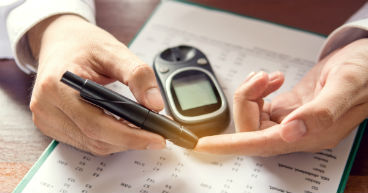
Cancer and diabetes are two of the most common and life-changing health issues worldwide. While scientists still do not fully understand the connections between these two diseases, most research shows that they often go hand in hand.
“It's clear that a patient with diabetes has an elevated risk of developing certain kinds of cancer. Whether it's a twofold or a tenfold increase depends on the type of cancer and the level of control that a patient has over their diabetes,” explains Debbie C. Thurmond, Ph.D., Director of the Arthur Riggs Diabetes & Metabolism Research Institute at City of Hope®.
This article examines what we know — and don’t know — about the link between cancer and diabetes, including the following topics:
- Does diabetes increase the risk for developing cancer?
- Can cancer cause diabetes?
- Does cancer cause high blood sugar?
- Diabetes and the risk of dying from cancer
- Shared risk factors for developing diabetes and cancer
- Lowering your risk
If you’ve been diagnosed with cancer and are interested in getting a second opinion on your diagnosis and treatment plan, call us or chat online with a member of our team.
Does diabetes increase the risk for developing cancer?
Diabetes develops when the pancreas does not produce enough of a protein called insulin in order to be able to process glucose — a kind of sugar our bodies need to create energy. A buildup of glucose in the body may lead to high blood sugar levels, increasing the risk for developing health issues affecting the heart, eyes, kidneys, circulatory system and other areas of the body.
While we don’t know whether diabetes causes cancer, we do know that people with diabetes are six times more likely to develop cancer than people who are not diabetic. The highest risk of a cancer diagnosis is in the first three months after being diagnosed with diabetes.
A study that tracked more than 20 million individuals showed that having type 2 diabetes is most likely to increase the risk for developing:
Those with type 1 diabetes, which accounts for 10 percent of all diabetes diagnoses, may also be at higher risk for developing some of these cancer types.
“The reason why there is this linkage is that both of these diseases are, simply put, symptomatic of dysregulated metabolism,” says Dr. Thurmond. “We have made great strides toward understanding some of the things that are at the interface of cancer and diabetes, which can help us determine why individuals with diabetes have this heightened risk and identify some specific opportunities for intervention.”
Can cancer cause diabetes?
We do not yet have any evidence of a direct connection between cancer and diabetes. However, some studies suggest a correlation between the two diseases.
Researchers in South Korea, for instance, followed more than a half-million people over the course of 10 years. Even when accounting for cancer risk factors, they found that those who were diagnosed with cancer within that period had a significantly higher risk for also developing diabetes.
Does cancer cause high blood sugar?
As far as we know, cancer does not directly cause high blood sugar. However, some cancer treatments may increase blood sugar levels. These include:
- Steroids, such as prednisone, which are used to prepare some patients for chemotherapy and radiotherapy therapy
- Some targeted therapies, such as the kinase inhibitor everolimus (Afinitor®)
In many cases, these increases in blood sugar levels resolve after treatment has finished, although some patients may be at higher risk for developing diabetes in the longer term.
“Sometimes it will resolve, so it's a temporary increase, and sometimes it does not,” explains Dr. Thurmond. “Every single survivor I've ever spoken to said that if they had to make that choice again, they would obviously choose surviving and deal with the consequences of diabetes. But our aspiration at City of Hope is to treat their cancer and not inadvertently cause diabetes.”
Diabetes and the risk of dying from cancer
Research suggests that people with cancer may be at greater risk for dying from the disease if they also have diabetes. However, more studies need to be conducted to understand whether this connection is direct, indirect or related only to cancer and diabetes sharing some major risk factors.
Shared risk factors for developing diabetes and cancer
Diabetes and cancer share a number of risk factors, including getting older. Other risk factors include:
- Obesity or being overweight
- Smoking
- Drinking alcohol to excess
- Being of African American or Hispanic descent
- Being sedentary
"Diet and activity may have direct effects on risk of cancer and diabetes and also play a major role in the energy-balance equation that helps individuals achieve and maintain a healthy body weight," says Carolyn Lammersfeld, M.B.A., M.S., R.D, Vice President of Integrative Care Services at City of Hope Cancer Centers Atlanta, Chicago and Phoenix.
Lowering your risk
The best way to manage your risk for developing cancer or diabetes, if you already have one of the two conditions, is to take a proactive approach to your health, Dr. Thurmond says.
“The primary thing is to seek care and to get proper guidance and diagnostics. One of the most important diagnostics for diabetes are A1C levels, which measures blood sugar over the past three months,” she explains. “If your A1C is hovering near the diagnostic benchmark for pre-diabetes or type 2 diabetes, your clinicians can help.”
Steps to lower cancer risk, if you are already diabetic, include:
- Maintaining a healthy weight
- Staying active
- Getting screened regularly for cancers associated with diabetes
- Eating healthy
"A plant-based diet that includes fish along with regular physical activity may help individuals achieve and maintain a healthy body weight to lower risk for both diseases," says Lammersfeld.
If you have been diagnosed with cancer and wish to reduce your risk of diabetes, it is also important to work with your integrative care team to create a plan for how to stay as active and healthy as possible while managing your blood sugar levels.
“During cancer treatment, eating quality food in the right quantities can be challenging,” Lammersfeld says. “If you are eating and feeling well, follow the guidelines for healthy eating. If you are struggling to eat, work with your health care team to make sure you meet your nutritional needs while also managing blood sugar."
If you’ve been diagnosed with cancer and are interested in getting a second opinion on your diagnosis and treatment plan, call us or chat online with a member of our team.



